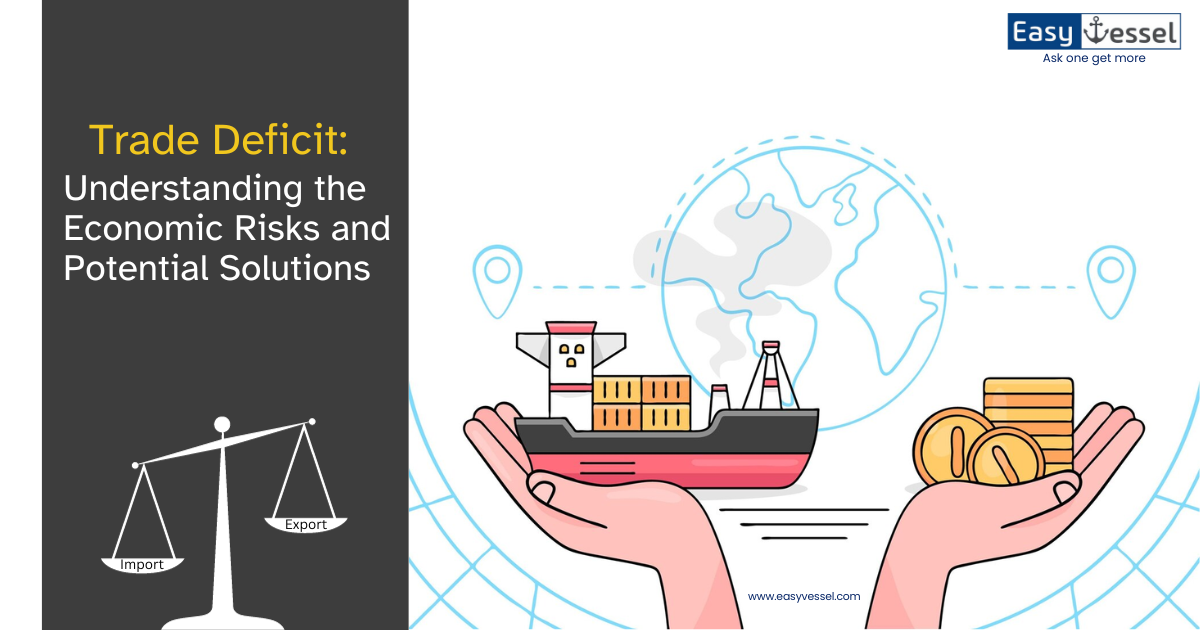- India’s exports are not growing as fast as its imports, which is leading to a wider trade deficit.
- This could be a problem because India needs to import oil and other essential goods from abroad.
- If India doesn’t earn enough foreign exchange from its exports, it could run out of money to pay for these imports.
- This could lead to a “balance of payments” crisis, which could cause economic chaos and inflation.
What is a Trade Deficit?
- A trade deficit occurs when a country buys more goods and services from other nations than it sells to them.
- A trade deficit happens when a country’s imports (goods and services it buys from other countries) exceed its exports (goods and services it sells to other countries).
- In simpler terms, it’s like spending more money on shopping for things from outside your country than you earn by selling your own stuff to others abroad.
- This imbalance in trade can lead to economic challenges, affecting jobs, industries, and the overall financial health of a nation.
Warning Signs: Risks Associated with Growing Trade Deficits
Here are 4 warning signs and risks associated with growing trade deficits:
High Import Demand: When people in a country prefer buying more stuff from other countries because of better quality, lower prices, or unique features, it leads to increased imports, contributing to a trade deficit.
Stronger Economy, More Spending: When a country’s economy is doing well, people tend to spend more. If local production can’t keep up with this demand, the country ends up buying more from other nations, causing a trade deficit.
Currency Value Changes: Continuously importing more than exporting can affect a nation’s currency value. A weaker currency raises the cost of imports, leading to inflation and potentially reducing consumers’ purchasing power.
Global Production Chains: Sometimes, countries import parts to make products locally. If the value of these imported parts is more than what the country earns by exporting the final product, it adds to the trade deficit. Trade deficits might strain international relationships and increase dependency on other countries for essential goods. This reliance could leave a nation vulnerable to disruptions in global trade networks.
“Addressing a trade deficit involves looking at how much a country imports versus exports and making changes in policies to balance these trade relationships.”
Impact on Trade Deficits
- Trade deficits mean a country buys more stuff from other nations than it sells to them.
- This can be tough for local industries, leading to job losses and economic struggles.
- Also, it might make the country’s money less valuable compared to others, raising prices for imported things and causing inflation, which affects what people can afford.
- To cover these deficits, countries sometimes borrow money from other places, creating debts that can mess with the country’s financial stability.
- Big and ongoing deficits can also create tension with other countries and make a nation rely too much on others for important things, making it vulnerable if global trade gets disrupted.
- Managing trade deficits means finding ways to sell more stuff abroad, help local industries, and aim for a balance where a country isn’t buying way more than it’s selling.
- Which helps keep the economy stable and relations with other countries smooth.
Mitigating Risks and Achieving Balance
- Addressing escalating trade deficits necessitates strategic measures.
- Boosting exports, supporting local industries, and negotiating trade agreements that ensure fair and balanced relationships with other nations are crucial steps.
- Emphasizing innovation and competitiveness within domestic industries also plays a vital role in addressing trade imbalances.
Conclusion:
As trade deficits continue to escalate, import-export businesses face unique challenges.
Proactive approaches and strategic adaptations can help mitigate risks, ensuring resilience in the face of a changing global trade landscape.
Easyvessel is the best way to connect importers and exporters with multiple freight forwarders to get freight rates in multiple shipping lines with 0% commission.
Save time and money at easyvessel.
References:
Frequently Asked Questions
When a country’s trade deficit grows, it needs foreign investors to balance what it’s buying and selling globally. This bigger deficit might also send jobs overseas because more imports often mean fewer local job openings.
A trade deficit can affect the stock market indirectly. It might show that a country is growing and needs more imports, which can be good. But it can also mean the country is having trouble selling its goods abroad, which could be bad for the stock market.
A mounting trade deficit can pose risks to an economy. It may lead to a weaker currency, impacting purchasing power and inflation rates. Moreover, reliance on imports can affect domestic industries, potentially causing job losses and hindering economic growth.
A trade deficit impacts India’s economy by weakening the rupee, increasing reliance on imports (especially for crucial goods like oil and electronics), potentially harming local industries and jobs, and impacting the country’s duty and economic growth if the deficit remains high.



